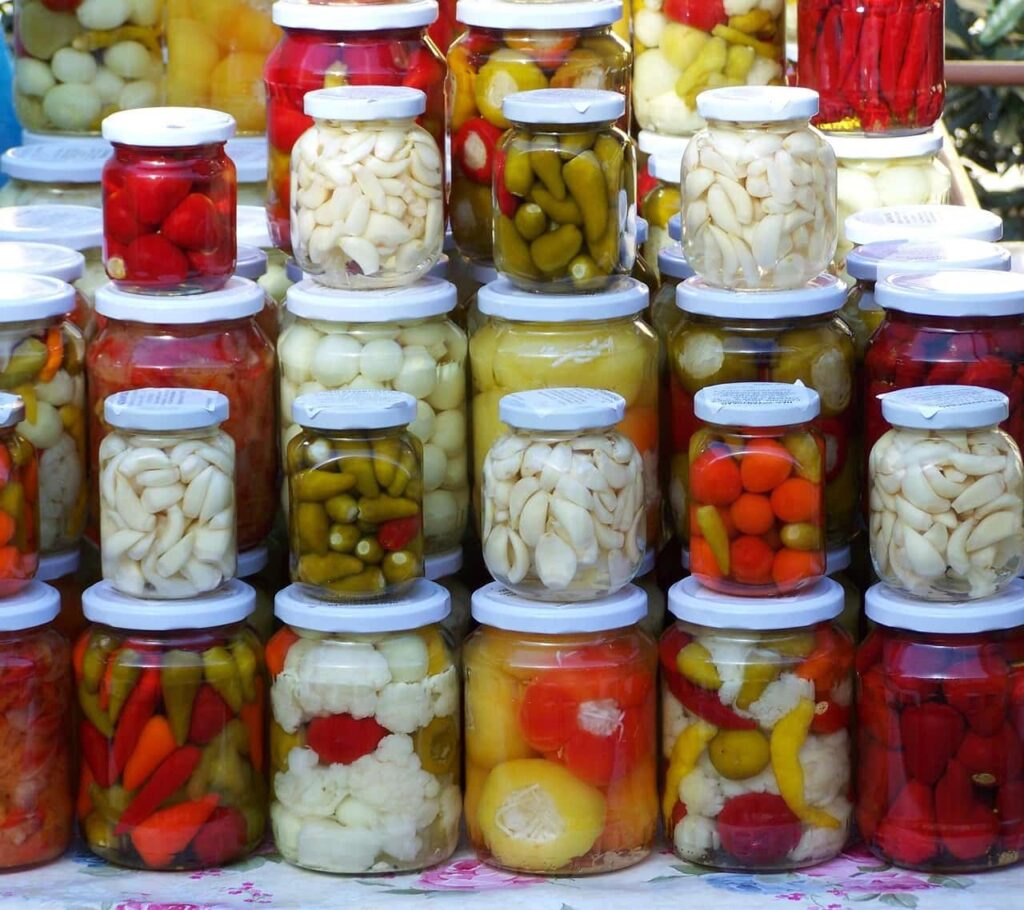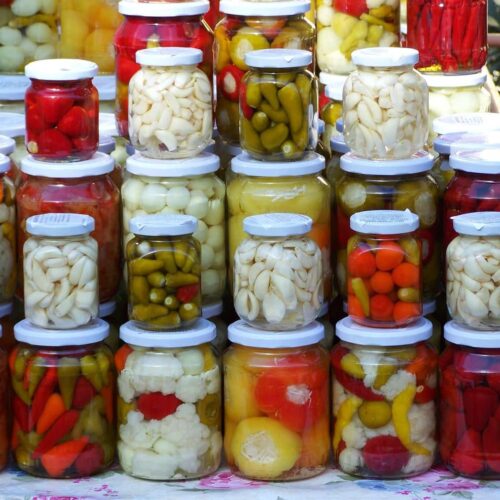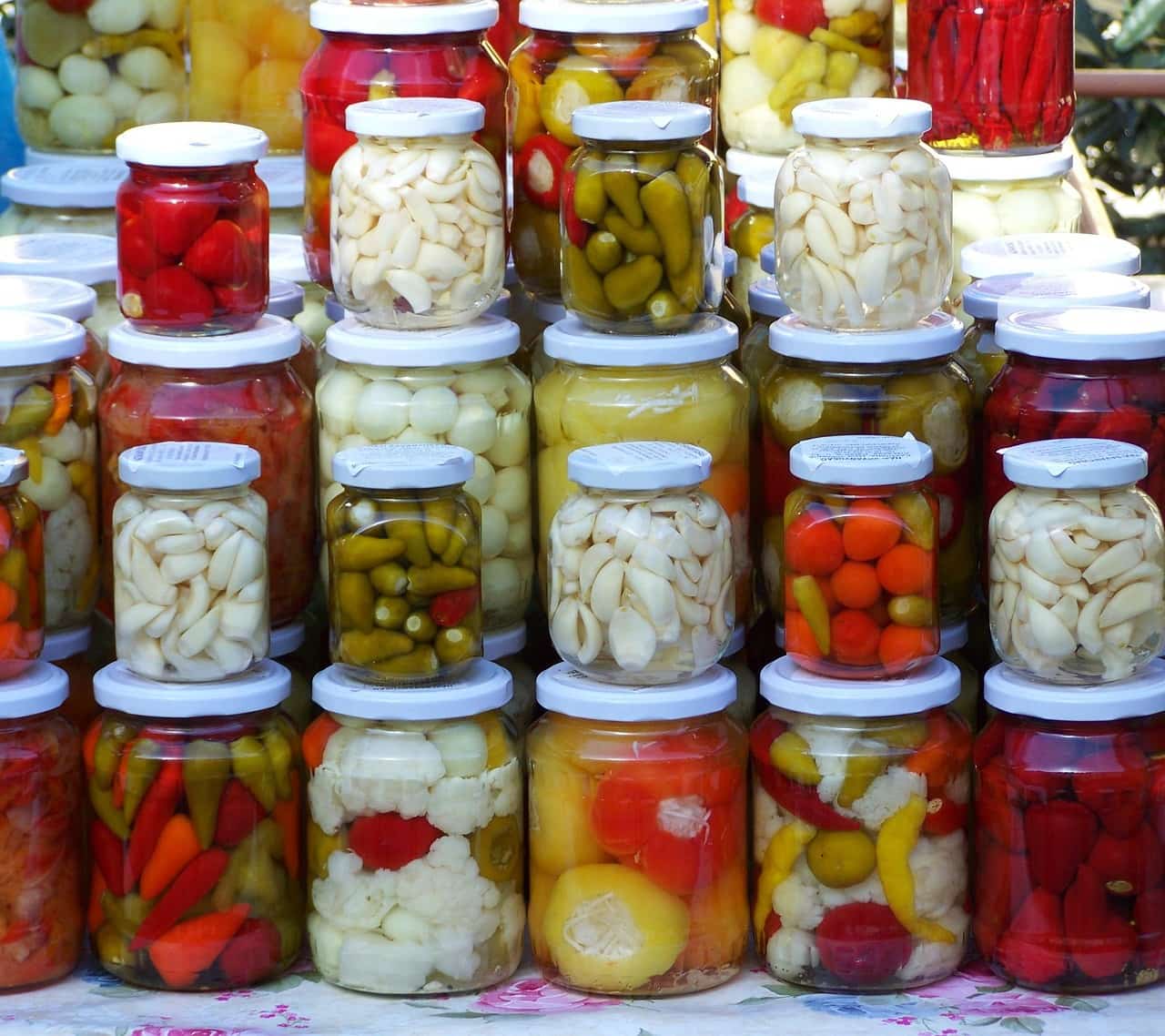Discover everything about pickles—from how they’re made to their health benefits. Learn tips, FAQs, and easy recipes for making delicious homemade pickles.

Ratings 05

What Is The Pickle
A pickle is a food item—typically a fruit or vegetable—that has been preserved in a solution such as brine (salt water) or vinegar, often with added spices, herbs, and seasonings. The process of pickling extends the shelf life of foods while enhancing their flavor with sour, salty, tangy, or even spicy notes.
01. Types Of Pickles
Vinegar-Based Pickles (Quick Pickles):
- Made using vinegar, salt, and sugar.
- Common in Western cuisine.
- Examples: pickled cucumbers, pickled onions.
02. Fermented Pickles
- Made through natural fermentation using salt and water.
- Beneficial bacteria (like lactobacillus) develop during fermentation.
- Examples: kimchi, sauerkraut.
03. Oil-Based Pickles (Especially In Indian Cuisine)
- Vegetables or fruits preserved in oil with spices.
- Examples: Indian mango pickle, lime pickle.
04. Common Pickled Foods
- Cucumbers (most common in the West)
- Onions
- Carrots
- Beets
- Eggs
- Cabbage (e.g., sauerkraut, kimchi)
- Mangoes
- Chillies
- Garlic
05. Why Pickle?
- Preservation: Extends the life of perishable foods.
- Flavor: Adds sour, spicy, or sweet notes.
- Nutrition: Probiotics discovered in fermented pickles can help maintain gut health.
Health Benefits Of Pickle
Pickles, depending on how they are made (fermented or vinegar-based), can offer several health benefits:
01. Rich In Probiotics (For Fermented Pickles)
- Kimchi and sauerkraut seem to be instances of fermented pickles that contain probiotics, or gut flora.
- These aid throughout digestion, encourage gut health, and potentially boost the immune system.
02. Good Source Of Antioxidants
- Pickled vegetables retain many of the antioxidants (like vitamin C, beta-carotene) found in raw produce.
- Antioxidants help fight free radicals, reducing inflammation and cell damage.
03. Improves Digestion
- The acidic nature of pickles (vinegar or lactic acid from fermentation) can stimulate stomach acids, aiding better digestion.
- Pickles often accompany heavy meals in many cultures for this reason.
04. Replenishes Electrolytes
- Pickle juice contains sodium, potassium, and magnesium, which help replenish electrolytes after exercise.
- Pickle juice is every once in a while used by athletes to relieve muscle cramps.
05. May Help Regulate Blood Sugar
- Some studies suggest that vinegar-based pickles may help reduce blood sugar spikes after meals by slowing down digestion of carbohydrates.
06. Low In Calories
- Due to their naturally low calorie count, pickles are a flavorful as well as guilt-free snack.
07. Note Of Caution
- High in sodium: Most pickles are very salty, which can increase blood pressure if eaten in excess.
- Added sugar: Some sweet pickles contain added sugars, so check the label or recipe if you’re watching sugar intake.
Tips For Making Pickles
Whether you’re making quick vinegar pickles or traditional fermented ones, these tips will help you get the best flavor, texture, and safety in your homemade pickles:
01. Use Fresh, High-Quality Produce
- Choose firm, unblemished vegetables or fruits.
- Pickles are crispier and tastier when the produce is fresh.
02. Cut Uniform Sizes
- Slice or chop ingredients evenly so they pickle at the same rate.
- Thin slices = faster pickling. Thick chunks = deeper flavor over time.
03. Use The Right Salt
- Use non-iodized salt like pickling salt, kosher salt, or sea salt.
- Steer well clear of table salt since it contains additives that can cloud brine.
04. Sterilize Your Jars
- Always wash and sterilize jars before use to prevent contamination.
- Boil jars and lids for 10 minutes or run them through a hot dishwasher cycle.
05. Pack Jars Tightly—But Don’t Crush
- Tightly pack vegetables to minimize air space, but don’t crush or bruise them.
- At the top of the jar, leave a few headspaces.
06. Use Fresh Herbs And Whole Spices
- Use whole garlic, dill, mustard seeds, peppercorns, or bay leaves for flavor.
- Avoid powdered spices—they can cloud the brine and make pickles muddy.
07. Heat The Brine (For Quick Pickles)
- Dissolve salt and sugar completely in vinegar and water before pouring it hot over the vegetables.
- This ensures flavor penetrates quickly.
08. Let Pickles Rest
- Allow at least 24–48 hours in the refrigerator before eating for best flavor.
- Fermented pickles may need 5–10 days at room temperature.
09. Store Properly
- Quick pickles must be stored in the refrigerator and used within 2–3 weeks.
- Fermented pickles should be kept in a cool, dark place during fermentation and then refrigerated.
10. Label Your Jars
- Always label with the date made and type of pickle so you can track freshness and flavor progress.
FAQ Pickle
Here are some frequently asked questions (FAQ) about pickles:
01. What’s The Difference Between Fermented And Vinegar Pickles?
Fermented pickles use saltwater brine and natural bacteria to preserve food (e.g., kimchi, sauerkraut).
Vinegar pickles are made with vinegar, which preserves and flavors vegetables without fermentation (e.g., bread-and-butter pickles).
02. How Long Do Homemade Pickles Last?
- Quick pickles (vinegar-based, refrigerated): up to 2–3 weeks.
- Fermented pickles: can last several months in the refrigerator after fermentation.
03. Why Is My Brine Cloudy?
Cloudy brine may occur due to:
- Use of table salt (which contains additives).
- Natural fermentation which produces cloudiness as a normal byproduct.Toss away the pickles if there is mold or a foul smell.
04. Can I Reuse Pickle Brine?
- For flavoring or cooking: yes.
- For pickling again: not recommended unless boiled and refreshed, especially for safety reasons.
05. Are Pickles Healthy?
Yes, in moderation. Fermented pickles provide probiotics; vinegar pickles can aid digestion. But both can be high in sodium, so balance intake accordingly.
06. What Creates My Pickles To Just Be Mushy Or Soft?
- Using overripe or old vegetables.
- Not enough salt or acidity.
- Hot brine poured over soft vegetables.
- To keep pickles crisp: use fresh produce, chill veggies before pickling, or add grape leaves or a small amount of tannin-rich tea to the jar.
07. Can I Pickle Fruits?
Yes! Fruits like mangoes, apples, pineapples, and lemons can be pickled with great flavor results—especially in Indian and Southeast Asian cuisines.
08. Do I Need To Refrigerate Pickles?
- Quick pickles: Yes, always refrigerate.
- Fermented pickles: No refrigeration during fermentation, but store in the fridge after fermenting.

Pickle
Ingredients
- 1 cup white vinegar (or apple cider vinegar)
- 1 cup water
- 1 tablespoon salt (non-iodized, like kosher or pickling salt)
- 1 tablespoon sugar (optional, adjust to taste)
- 2–3 cups vegetables, sliced (e.g., cucumbers, carrots, onions, radishes, cauliflower)
- 1–2 garlic cloves (optional)
- 1 teaspoon mustard seeds (optional)
- 1/2 teaspoon black peppercorns (optional)
- Fresh herbs (like dill or thyme – optional)
Instructions
- Prepare vegetables:Wash and slice your vegetables into desired shapes (rounds, sticks, or florets).
- Sterilize jars: Clean your jars and lids with hot soapy water or boil them for a few minutes. Let them dry completely.
- Pack jars: Tightly pack the sliced vegetables into the jars along with garlic, herbs, and spices.
- Make the brine: In a small saucepan, combine vinegar, water, salt, and sugar. Heat over medium heat until the salt and sugar dissolve. Remove from heat.
- Pour brine over vegetables: Carefully pour the hot brine into the jars, covering the vegetables completely. Tap the jars gently to release air bubbles.
- Seal and cool: Close the jars with lids. Let them cool to room temperature.
- Refrigerate: Store in the fridge. Let the pickles sit for at least 24 hours before eating for best flavor. They improve over a few days and last for up to 2–3 weeks.
-
Pickle
Discover everything about pickles—from how they’re made to their health benefits. Learn tips, FAQs, and easy recipes for making delicious homemade pickles. Ratings 05 What Is The Pickle A pickle is a food item—typically a fruit or vegetable—that has been preserved in a solution such as brine (salt water) or vinegar, often with added spices,…


Leave a Comment